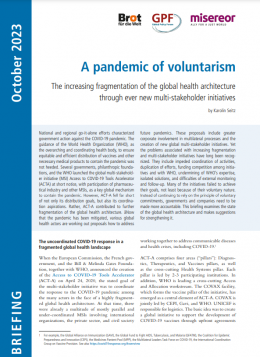National and regional go-it-alone efforts characterized government action against the COVID-19 pandemic. The guidance of the World Health Organization (WHO), as the overarching and coordinating health body, to ensure equitable and efficient distribution of vaccines and other necessary medical products to contain the pandemic was not heeded. Several governments, philanthropic foundations, and the WHO launched the global multi-stakeholder initiative (MSI) Access to COVID-19 Tools Accelerator (ACT-A) at short notice, with participation of pharmaceutical industry and other MSIs, as a key global mechanism to contain the pandemic. However, ACT-A fell far short of not only its distribution goals, but also its coordination aspirations. Rather, ACT-A contributed to further fragmentation of the global health architecture. Now
that the pandemic has been mitigated, various global health actors are working out proposals how to address future pandemics. These proposals include greater corporate involvement in multilateral processes and the creation of new global multi-stakeholder initiatives. Yet the problems associated with increasing fragmentation and multi-stakeholder initiatives have long been recognized. They include impeded coordination of activities, duplication of efforts, funding competition among initiatives and with WHO, undermining of WHO’s expertise, isolated solutions, and difficulties of external monitoring and follow-up. Many of the initiatives failed to achieve their goals, not least because of their voluntary nature. Instead of continuing to rely on the principle of voluntary commitments, governments and companies need to be made more accountable. This briefing examines the state of the global health architecture and makes suggestions for strengthening it.
A pandemic of voluntarism
The increasing fragmentation of the global health architecture through ever new multi-stakeholder initiatives

